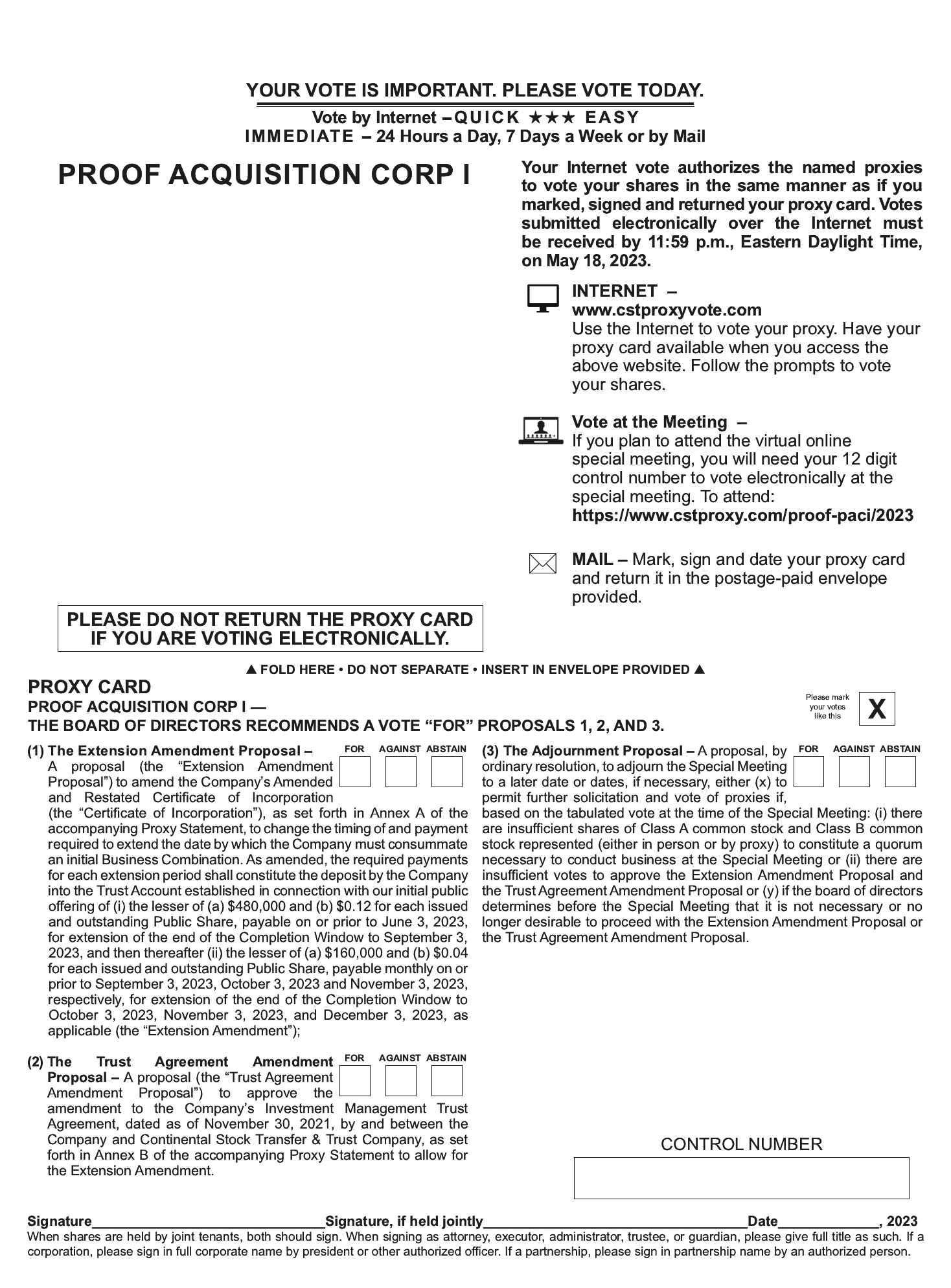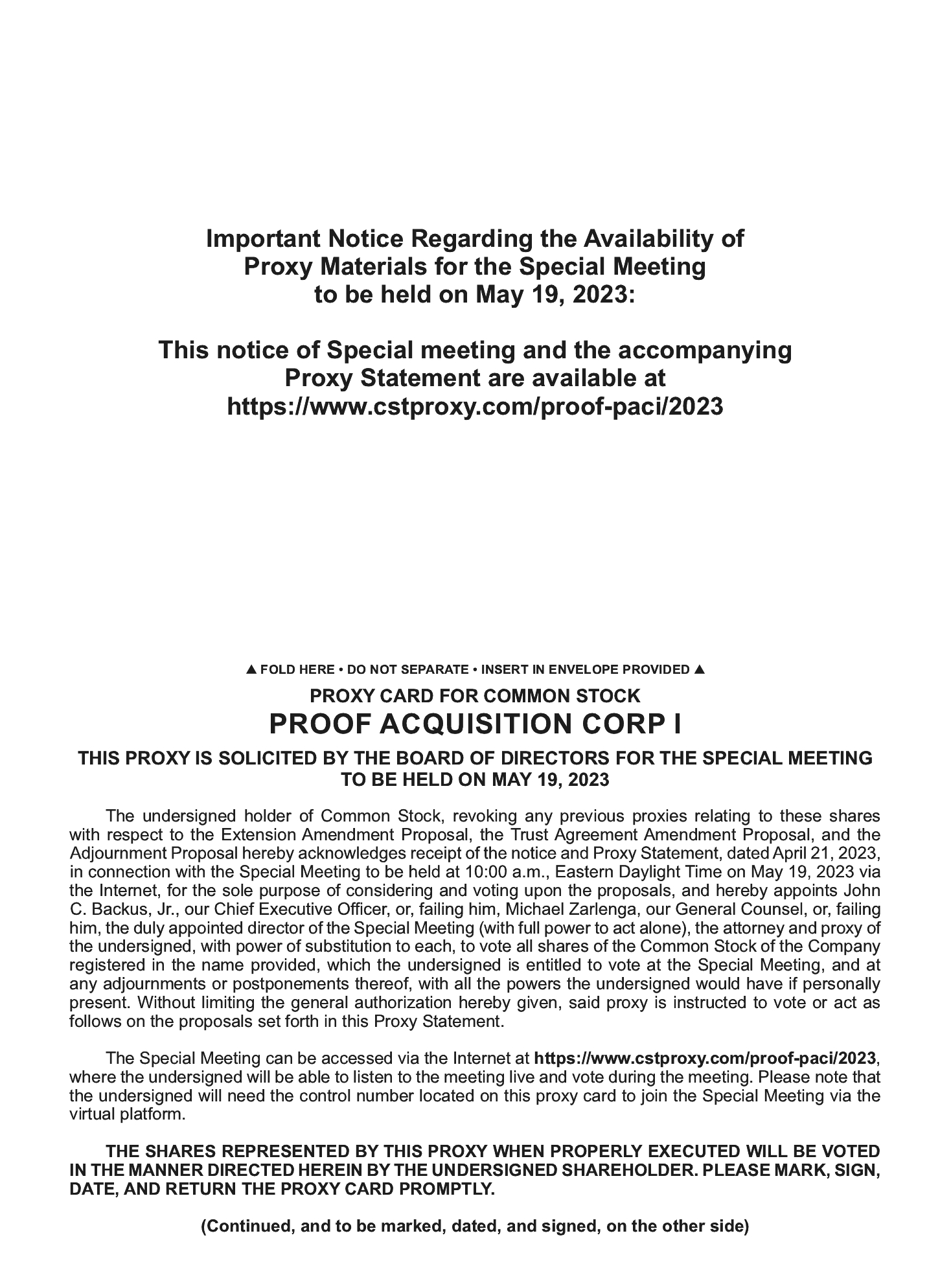Record Date, Voting, and Quorum
Our Board fixed 5:00 p.m., Eastern Daylight Time, on April 6, 2023 as the Record Date for the determination of holders of our outstanding shares of Common Stock entitled to notice of and to vote on all matters presented at the Special Meeting. As of the Record Date, there were 34,500,000 shares of Common Stock, including 27,600,000 shares of Class A Common Stock and 6,900,000 shares of Class B Common Stock, issued, outstanding, and entitled to vote. Each share entitles the holder thereof to one vote. The holders or the authorized proxies of the holders of 17,250,001 shares of Common Stock must be present at the Special Meeting to constitute a quorum.
Required Vote
The Extension Amendment Proposal, pursuant to the Certificate of Incorporation, must be approved by the affirmative vote of the holders of sixty-five percent (65%) of the outstanding shares of Common Stock entitled to vote.
The Trust Agreement Amendment Proposal, pursuant to the Trust Agreement, must be approved by the affirmative vote of the holders of sixty-five percent (65%) of the outstanding shares of Common Stock entitled to vote.
The Adjournment Proposal must be approved by the affirmative vote of the holders of a simple majority of the issued and outstanding shares of Common Stock, who, being present in person (including virtually) or represented by proxy at the Special Meeting or any adjournment thereof and entitled to vote on such matter, vote at the Special Meeting.
Abstentions and broker non-votes, while considered present for the purposes of establishing a quorum, will not count as votes cast and will have no effect on the Proposals. Failure to vote by proxy or to vote in person at the Special Meeting will have no effect on the Proposals.
Voting
You can vote your shares by proxy or at the Special Meeting in person online.
You can vote by proxy by having one or more individuals who will be at the Special Meeting vote your shares for you. These individuals are called “proxies” and using them to cast your ballot at the Special Meeting is called voting “by proxy.”
If you wish to vote by proxy, you must (i) complete the enclosed form, called a “proxy card,” and mail it in the envelope provided or (ii) submit your proxy over the internet in accordance with the instructions on the enclosed proxy card or voting instruction card.
If you complete the proxy card and mail it in the envelope provided or submit your proxy over the internet as described above, you will designate John C. Backus, Jr., our Chief Executive Officer, or, failing him, Michael Zarlenga, our General Counsel, or, failing him, the duly appointed director to act as your proxy at the Special Meeting. Mr. Backus, Mr. Zarlenga, or the duly appointed director, as applicable, will then vote your shares at the Special Meeting in accordance with the instructions you have given them in the proxy card or voting instructions with respect to the Proposals presented in this Proxy Statement. Proxies will extend to, and be voted at, any adjournment(s) or postponement(s) of the Special Meeting.
Alternatively, you can vote your shares online by attending the Special Meeting in person online. Pursuant to the bylaws of the Company, no other business except that which is set forth in the Notice of the Special Meeting may be transacted at the Special Meeting. However, while we know of no other matters that may properly come before the Special Meeting, it is possible that other administrative matters may be voted on at the Special Meeting. If that happens and you have signed and not revoked a proxy card, your shares will be voted in accordance with the best judgment of Mr. Backus or Mr. Zarlenga.
A special note for those who plan to attend the Special Meeting and vote online: if your shares are held in the name of a broker, bank, or other nominee, you must either direct the record holder of your shares to vote your shares or obtain a legal proxy from the record holder to vote your shares at the Special Meeting.
Our Board is asking for your proxy. Giving the Board your proxy means you authorize it to vote your shares at the Special Meeting in the manner you direct. You may vote for or withhold your vote for each of the Proposals or you may abstain from voting. All valid proxies received prior to the Special Meeting will be voted. All shares


